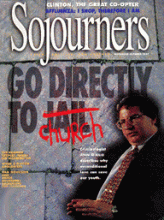Psychologist B.F. Skinner once said, "Education is what survives when what has been learned has been forgotten." Often what makes for a quality education is not the reputation of the school, or the wealth of the community around it, but the passion of an individual educator for teaching.
With that definition, Robert Hoderny, who taught social justice at Archbishop Carroll High School in Washington, D.C., was the truest of educators. Robert was one of those teachers students never forget. I knew him for two decades, spoke to his classes, and my own son was his student. He was a gifted teacher who died last winter at age 48—far too early—after being hit by a car. At a time when educational excellence is taking a nose dive, I cannot imagine a greater tragedy for teaching.
Once I was at a ticket counter at National Airport with homeless activist Mitch Snyder. The ticket agent looked up and said, "Excuse me, Mr. Snyder, I learned about you in school. You see, I was in Mr. Hoderny’s class." That happened to us often over the years, a testament to education that survives.
During the school year, Robert’s students studied a host of issues current to the day—homelessness, handgun control, war and peace, and so on. He didn’t just present one side of the story. For instance, when his students studied gun control, they heard from the predictable sources as well as from the NRA.
A successful school does not exist as an island, but engages the community around it. It was that community which was Robert’s classroom. Each Saturday his classes staffed the Zacchaeus soup kitchen. It was a requirement to pass his class. At least once each school year, Robert’s students planned a demonstration on an issue that grabbed their attention, and then carried it out. He taught them that being a citizen in a participatory democracy means participating.
Read the Full Article
